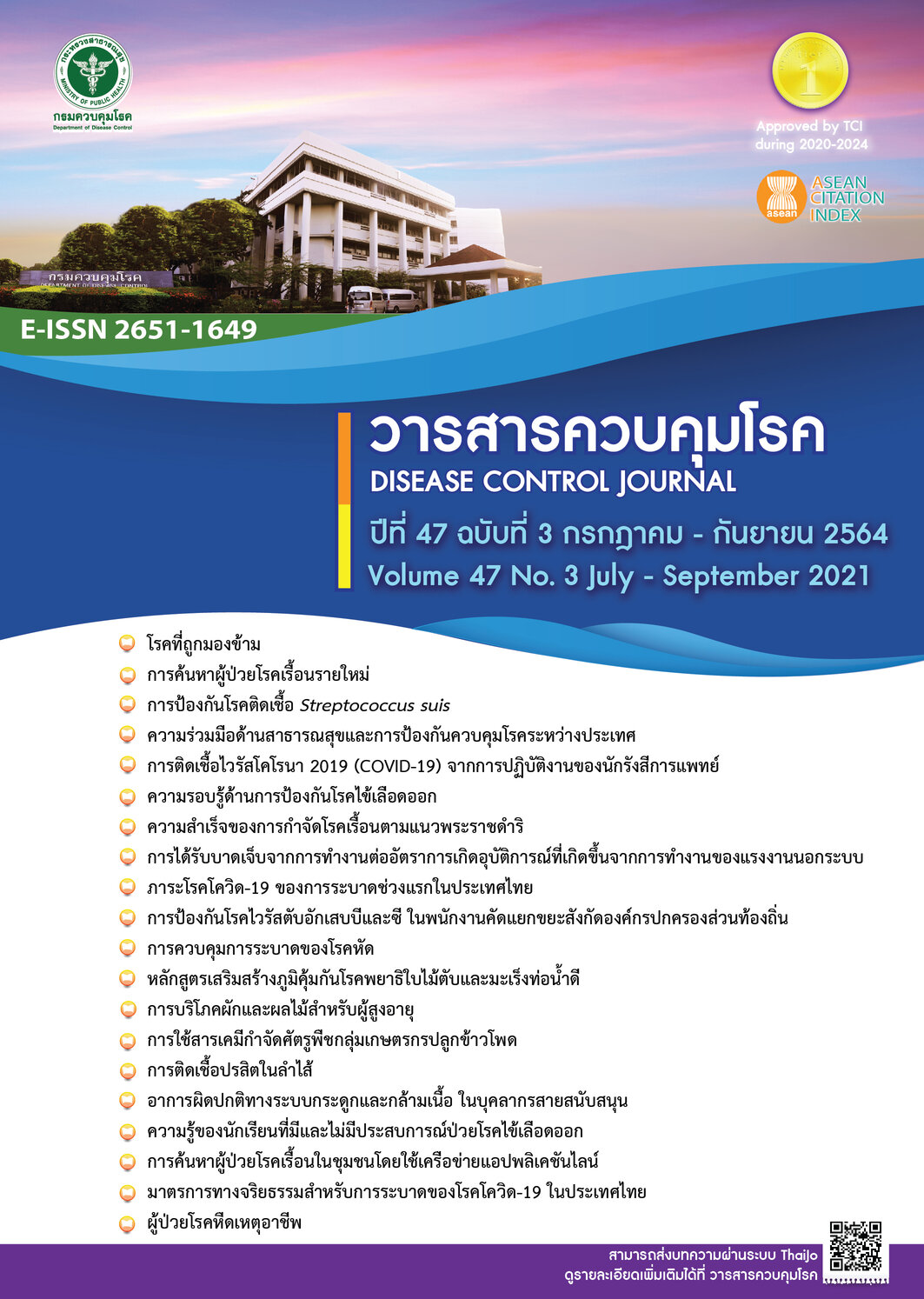Knowledge Memory Retention of a Prevention Course on Liver Fluke and Bile Duct Cancer in the curriculum for Upper Secondary Student Level in the Northeast Region, Thailand
DOI:
https://doi.org/10.14456/dcj.2021.49Keywords:
Retention, Liver Fluke and Bile Duct CancerAbstract
The purpose of this study was to determine the knowledge memory retention after implementing a prevention course of liver fluke and bile duct cancer into the curriculum for the upper secondary students in the Northeast region, Thailand. We conducted a quantitative research. The target groups were grade 10 students in the Northeast region who enrolled in the curriculum. By simple random sampling technique, we selected 3 classrooms from 3 provinces located on different basins: Roi-Et in the Chi river basin, Surin in the Moon river basin, and Nakhon Phanom in the Songkram basin. Data were analyzed by mean score, standard deviation and paired t test with level of statistical significance at 0.05. It was found that 1-month knowledge memory retention score after the course of the 3 selected classroom had no statistically significant different from the posttest achievement score. In other words, students who enrolled the curriculum retain their knowledge on the prevention of liver fluke and bile duct cancer.
Downloads
References
Boonmars T, The evolution of liver fluke and bile duct cancer. Khon Kaen: Khon kaen University; 2015. (in Thai)
Khuntikeo N. The project to solve the problems of liver fluke and bile duct cancer: The North East Region. CASCAP Project Journal. 2016;2: 4-5. (in Thai)
Wongsaroj T, Nithikathkul C, Rojkitikul W, Nakai W, Royal L, Rammasut P. National Survey of helminthiasis in Thailand, 2009. Asian Biomedicine, 2014:8(6);779-83. doi:10.5372/1905-7415.0806.357
Saylor J Galen, Alexander William M. Planning Curriculum for schools. New York: Holt Rinehart and Winston; 1974.
Kptrakoon S. Education psychology. 11th edition Bangkok: Chulalongkorn University Printing House; 2013. (in Thai)
Thumthong B. Theories and development of instructional model. 2nd ed. Bangkok: Chulalongkorn University Printing House; 2013. (in Thai)Paerattanakul C. Measurement Techniques. 7th ed; Bangkok: Witoon Printing Company; 2009. (in Thai)
Lertwittayakul T, Nethanomsak T, Loilom W. Effectiveness of curriculum trial to enhance the upper secondary student level students performance by using immunization course of Opisthorchiasis and Cholangiocarcinoma in the northeast region, Thailand. Disease Control Journal. 2020;46(3):381-392. (in Thai)
Hoy Woolfolk A. Educational psychology. 9th ed. London:Allyn and Bacon; 2004.
Prawit A. Classroom Research. Bangkok: Dokya Academic Printing Company; (2002). (in Thai)
Thumthong B. Curriculum Development. 4th ed. Bangkok: Chulalongkorn University Printing House; 2014. (in Thai)
Downloads
Published
How to Cite
Issue
Section
License
Articles published in the Disease Control Journal are considered as academic work, research or analysis of the personal opinion of the authors, not the opinion of the Thailand Department of Disease Control or editorial team. The authors must be responsible for their articles.






